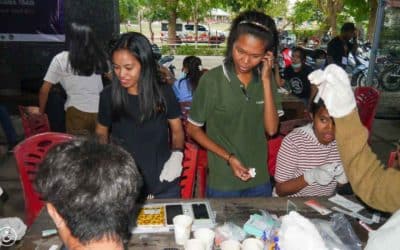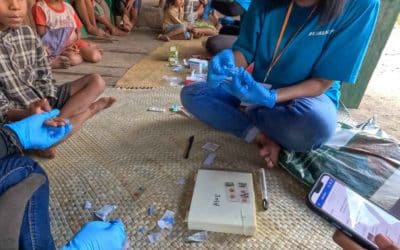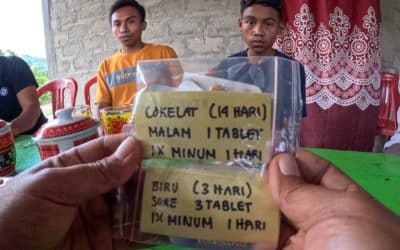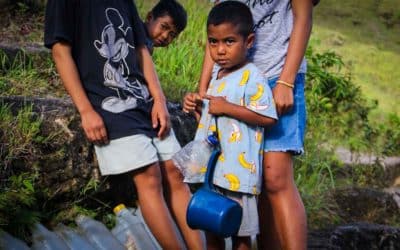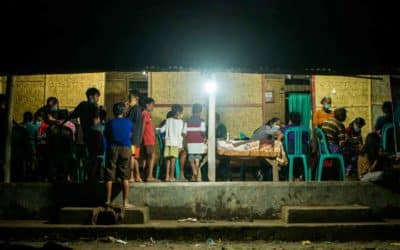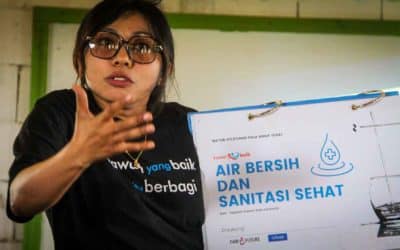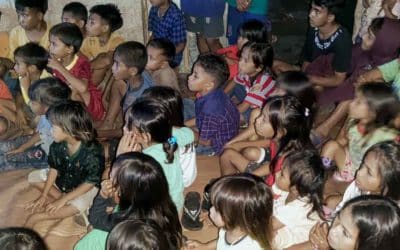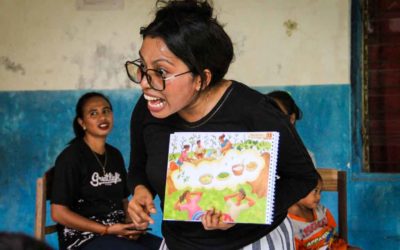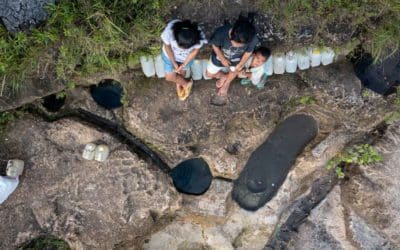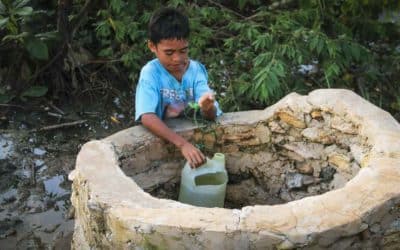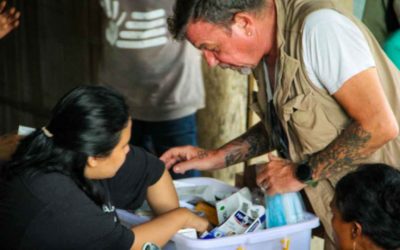In the fight against malaria in East Sumba, volunteers stand at the front lines, embodying hope, dedication, and community-driven action. Discover how these everyday heroes, contributing to Fair Future Foundation’s #ZeroMalaria initiative, are changing the landscape of public health. Their hands administer life-saving treatments, their voices educate vulnerable communities, and their efforts are the cornerstone of a better, healthier future.
Illness often begins long before someone arrives at the hospital. Our campaigns on smoking, waste management, alcohol, and sexual health display straightforward messages across schools and village walls in local languages. Through simple posters, talks, and games, we help protect thousands of children.
Donate
Support Care
Programs
All projects
Quick News
Field updates
Stories
Field stories
Combating cholera outbreaks in ultra-rural areas with prevention, treatment, and education campaigns.
#ZeroMalaria Campaign: Fair Future’s Life-Saving Mission
Championing the #ZeroMalaria Cause: Fair Future’s Tireless Efforts in Sumba East. This image reflects our unwavering commitment to the #ZeroMalaria cause. Together, we’re illuminating a path to a malaria-free future. Each test, done twice for accuracy, symbolises hope in the fight against malaria. Our teams also collect essential socio-medical data to track progress.
In the heart of one of Indonesia’s poorest and most disadvantaged regions, as well as one of the highest malaria prevalence areas in the world, Fair Future, in collaboration with Kawan Baik and Sumba Volunteer, is waging an unrelenting battle against the deadly scourge of malaria. Under the banner of #ZeroMalaria, this vital campaign is not just about medical intervention; it’s about transforming lives and ensuring every community member has a chance at a healthier future.
The Challenge of Malaria in Sumba East: Sumba East is a region where basic amenities like electricity, clean water, and sanitation facilities are virtually non-existent. Here, people face a daily struggle for survival against malaria and various other infectious diseases. Malaria, in particular, poses a significant threat to the lives of the local population.
Malaria is transmitted through the bite of infected female Anopheles mosquitoes and can have devastating consequences if left untreated. The disease can rapidly progress from fever and chills to severe anaemia, organ failure, and even death. Vulnerable groups, such as pregnant women and children, are at higher risk.
Fair Future’s Double-Testing Approach: Precision is paramount in the battle against malaria. Fair Future’s dedicated medical teams, including doctors, nurses, and laboratory technicians, work tirelessly to ensure that every case is accurately diagnosed and treated.
Our teams conduct tens of thousands of malaria tests, and each test is done twice – once using rapid diagnostic tests and another through blood tests analyzed using microscopes, all performed directly in the field. This rigorous double-testing approach ensures the highest level of accuracy, especially in an area where access to modern medical facilities is severely limited.
Collecting Socio-Medical Data: Beyond diagnosis and treatment, Fair Future recognises the importance of comprehensive data collection to guide its efforts. The captivating photo accompanying this article shows our teams diligently gathering socio-medical data from every family member and villager. This data is entered into Fair Future’s proprietary application, meticulously developed and funded by the organisation. The application serves as a crucial tool for tracking and tracing the regions where we implement the #ZeroMalaria program.
The Urgent Need for #ZeroMalaria: It’s important to remember that malaria remains a significant threat in regions like Sumba East, where people continue to lose their lives to this preventable and treatable disease. Pregnant women and children are particularly vulnerable.
The #ZeroMalaria program represents a lifeline for these communities, providing medical care, education, and awareness about malaria prevention. Fair Future is committed to ensuring that no one in Sumba East loses their life to malaria, and your support is instrumental in achieving this goal.
In closing, the battle against malaria in East Sumba is ongoing, and the stakes couldn’t be higher. Through #ZeroMalaria, Fair Future is determined to change the narrative, transform these communities, and to save lives. Join us in this life-saving mission!
Thank you very much for your support.
Alex Wettstein – Fair Future Foundation medico-social camp in East Sumba – Rumah Kambera, Lambanapu,
September 21st, 2023.
Combatting Malaria in Sumba: A Crucial Health Battle
This new "picture of the day", shows a 14-year-old young kid suffering from malaria for the second time, whom we have tested twice and is receiving his medical treatment. We explained that he must take these medications every day for fourteen days. We explain why and the risks if he doesn't. A nurse is present and will ensure regular check-ups to ensure everything is going well for him.
The fight against malaria in Sumba is an intense and crucial battle for the population's health. Every positive case, like that of this young man from Lulundilu, Kecermatan Mahu, East Sumba, requires immediate medical intervention and rigorous treatment that extends over a period of 14 days without interruption.
This young man belongs to a large family of seven siblings, all of whom have been affected by malaria before. Although he is fortunate not to have lost any close family members to this disease, it is essential to understand that malaria is wreaking havoc in this region. Our team visited his home and conducted two tests to confirm his infection, first with a rapid test and then with blood tests and microscopic analysis. Both times, the results were positive, indicating that he was carrying the Plasmodium falciparum parasite.
As with all malaria cases, Fair Future takes over the medical treatment. It is crucial that this young man diligently follows his treatment because the risks to his life are extremely high if he does not. That's why we have mobilized staff from the nearest healthcare centre, Puskesmas Mahu, to ensure that he receives his medical treatment appropriately and monitor his progress.
It is important to emphasize that since the beginning of 2023, in Sumba alone, 18 pregnant women have lost their lives due to malaria due to a lack of screening, information, proper medical care, and appropriate treatment. This tragedy highlights the need to strengthen our fight against malaria and ensure equitable access to medical care for all community members.
The Fair Future team remains determined to do everything possible to end this threat to public health and ensure that every individual has access to the necessary medical care to combat malaria and other serious illnesses. Your support and donations are essential for this mission's success and saving lives.
Thank you very much for your support.
Alex Wettstein – Fair Future Foundation medico-social camp in East Sumba – Rumah Kambera, Lambanapu,
September 21st, 2023.
The #WaterConnections project in Laindatang has started!
In this new "Picture of the Day", we witness the difficulties faced by young children in East Sumba as they search for clean water. These children must travel quite a distance from their homes to reach the kullups (small stone basins dug directly into the rocky terrain by villagers to collect and hold rainwater in rural areas). Unfortunately, it is unlikely to rain for the next nine months, and the children must walk over ten kilometres to obtain just a few litres of water to sustain themselves; kullups are dry now.
Presently, families in Laindatang endure arduous journeys, spanning miles and lasting over 10 hours, to obtain meagre quantities of drinking water. With a daily allocation of fewer than 2 litres per person, individuals must make profound sacrifices as this limited supply must accommodate drinking, eating, personal hygiene, and sanitation needs.
Malaria ravages the village, exacerbating the adverse effects of infectious diseases, particularly among children under five. The urgency of the health crisis necessitates immediate intervention. In collaboration with Kawan Baik and local authorities, Fair Future is committed to launching a comprehensive Water Connections project, addressing the pressing need for clean water in the village with utmost urgency.
Commencing at the end of June 2023, Fair Future embarks on an extraordinary #waterconnections project in Laindatang. This initiative heralds a transformative change and instils immense pride within our organization.
Laindatang residents rely on rainwater collection during the rainy season to meet their clean water requirements. However, limited knowledge and resources impede this method, significantly contaminating water reservoirs. During the dry season, their options are limited to accessing water from the Kulub—an artificial pool nestled within a rock formation—or purchasing tank water from a select few companies.
Regrettably, accessing water becomes increasingly challenging throughout the year, with only a handful of companies willing to deliver to the village. Transport obstacles frequently result in spilt water, further diminishing the already scarce supply upon arrival in Laindatang.
For the villagers, access to clean water is a matter of survival. They currently store rainwater in unclean, contaminated, and hazardous tanks. Though this remaining water sustains them for drinking, eating, and survival, it will be depleted within weeks as the dry season commences. Tragically, this water is tainted, infected, and carries life-threatening diseases such as Malaria, Cholera, Dengue, Typhoid fever, Hepatitis A, and Guinea worm disease. Additionally, prevalent diarrheal diseases like E. coli and rotavirus, caused by contaminated water, pose a severe risk, particularly to children, leading to dehydration and even death.
You have the power to help us realize this vital project, which is indispensable for hundreds of families. If you desire, your generous donation dedicated to the #waterconnections project in the village of Laindatang would be warmly welcomed. We extend our heartfelt gratitude and appreciation to all those willing to contribute. With your support, we can bring love, hope, and clean water to the deserving community of Laindatang.
To access information about our implementation, you can download and read the presentation in PDF format by clicking this link.
Disease prevention, detection and treatment in rural areas
The teams of Fair Future and Kawan Baik are highly respected for their steadfast dedication to assisting ill and underprivileged individuals residing in far-flung rural areas of eastern Indonesia. Their selflessness holds true significance to them. However, it's not widely known that their medical and social teams put in tireless efforts, even during nighttime and 7-day workweeks. Through this new "Picture of the Day," we offer you the opportunity to witness their work as they combat health issues like malaria, unsafe water, and malnutrition while sacrificing their sleep.
Diseases can strike at any time, even in the darkness of night. The teams, equipped with masks and Sumba coffee, fight against these illnesses. And during this time of the malaria epidemic, doctors, nurses and volunteers are working tirelessly to provide treatment to patients.
Their dedication and passion go above and beyond the call of duty, even working late into the night to provide lifesaving care. They save lives and do so with unwavering energy and enthusiasm.
On the spot, at all hours of the day or night, they not only treat the symptoms, they also attack the root causes of health problems. Fair Future and Kawan Baik foundation fight against diseases related to dirty water by providing facilities through the #waterconnections program and raising awareness in communities about the importance of hygiene. Their mission is to make communities more resilient and prevent diseases before they even appear.
Even when faced with difficult challenges and trying situations, the teams remain resilient and optimistic. Their sense of humor is a crucial component that aids them in overcoming tough times. It also fosters a strong bond between them, enabling them to maintain a positive outlook.
Alex Wettstein shares a few words about the Foundation's medical and social teams, who work tirelessly to help people who are sick or have urgent needs.
Water and sanitation are crucial in the fight against malaria
Check out the latest addition to our "Photo of the Day" collection featuring our colleague Kawean Essi. In the village of Mbinudita (East Sumba), Kawan Essi teaches a hundred villagers of all ages, including children, about the importance of clean and safe water and how it can lead to a healthier life. The "Water Connections" program is a practical approach to fight against various infectious diseases, such as malaria.
In the fight against malaria, it's essential to acknowledge the progress made. However, we must also recognize the crucial role of hygiene, clean water, and sanitation in eliminating this disease. This is why the Water Connections program exists – to provide access to these necessities.
At Fair Future, we understand that improving these fundamental aspects of daily life can significantly prevent malaria transmission and ultimately save lives. Addressing issues such as hygiene, water, and sanitation is crucial in the fight against malaria because they directly impact mosquito breeding, access to clean water, hygiene practices, and vector management.
We prioritize these issues in all our activities, particularly in implementing the "Malaria Prevention Initiative Sumba Timur 2023" program, which we aim to start as soon as possible as part of the PMC, Primary Medical Care program.
Together, we can dramatically reduce malaria transmission and improve the health and well-being of affected communities. We must prioritize these efforts to save lives, prevent unnecessary suffering, and move towards a significant decrease in malaria cases, especially here in Sumba, where we currently are.
Empowering Health and Transforming Lives of Children
This new "Picture of the Day" displays a gathering of children in one of the homes in the remote village of Mbatapuhu, East Sumba. Our dedicated socio-medical team educates them on the importance of self-care, utilizing the "Kawan Sehat" guidebook. This village is situated in a challenging location with no access to electricity, clean water, or sanitation facilities. The nearest medical centre is over two hours away by motorbike or a gruelling six-hour walk. The villagers rely on nature for their restroom needs. Unfortunately, due to poor hygiene practices, malaria has become a significant issue. Additionally, malnutrition is a primary concern in this impoverished and rural community.
In the remote villages of East Sumba, the Fair Future Foundation conducts information sessions for children under the "Kawan Sehat" program during every visit. We collaborate with members of these rural communities to disseminate crucial information on maintaining good health, accessing better healthcare, and protecting oneself from diseases like malaria and dengue fever. These sessions, which are both informative and fun, equip children with the knowledge they need to lead healthier, more promising lives.
Malaria and dengue fever are grave illnesses that frequently afflict the rural areas of East Sumba. Through these sessions, we educate children on preventive measures such as using insecticide-treated bed nets, eliminating stagnant water and seeking medical assistance immediately upon experiencing symptoms. Through promoting this knowledge, we hope to significantly reduce the incidence of these diseases and safeguard children's health. The "Malaria Prevention Initiative Sumba Timur 2023" program was launched to combat malaria.
These sessions are not limited to specific illnesses but also cover topics such as personal hygiene, balanced nutrition, and healthy lifestyles. Children are encouraged to adopt positive habits like handwashing, consuming nutritious foods, and exercising. By incorporating such practices into their daily lives, they can develop more robust, healthier, and resilient bodies.
The Fair Future and Kawan Baik teams empower children and strengthen entire communities by providing vital information on disease prevention and healthy habits.
Primary Medical Care Progress Report
The Primary Medical Care (PMC) program has made a remarkable difference in the rural communities of East Sumba, providing over a thousand treatments that offer critical medical assistance to those in need. Through their unwavering dedication and hard work, the women of the region have been empowered to take control of the health and welfare of their ultra-rural communities. By providing them with the essential knowledge, resources and tools, we have successfully equipped them to face all the socio-medical challenges that come their way. Over nearly five months, Fair Future and Kawan Baik, our partners, all participants, and teams collaborated to go above and beyond in reaching the most challenging areas and evaluating the impact of the field program. The results are awe-inspiring, leaving no doubt that the Primary Medical Care program is the definitive solution to ensure everyone can access emergency medical assistance.
Kullup is a hole in the rock to collect rainwater
This new "Picture of the Day" shows you kids from the village of Laidatang, who fetch water far from home in the "Kullup" of the village. Elthon, responsible for documentation (with the black t-shirt), and Alex, from the medical staff, are also present in this photo. With the kids and one or two adults accompanying us, we walk more than an hour to reach this place in the middle of a high hill. You must descend a steep path to access these hand-dug holes in the rock. In 30 minutes, we will have to go up the hill and walk back. But this time, loaded with several jerrycans filled to the brim.
The Fair Future and Kawan Baik teams spend two days with the families of the ultra-rural and isolated village of Laindatang to get to know them even better. In this village, we have the project to create a #WaterConnections project. I let you read here the articles related to this project and here to see what your want to do to save their lives,
In Laindatang, families only have access to rainwater. It's for everything: eating, drinking, cooking, bathing, washing clothes, drinking water, caring for children, sick people or watering animals. Therefore, one of the ways for women and young girls to have water at home to live on is to walk several kilometres to find the "Kullup".
Kullup, what is it? These are small stone basins, directly dug into the rock by the villagers, used to collect and store rainwater in rural areas. When it rains, the water seeps into the ground at the top of the hill and then is filtered through the earth and the basements. It flows drop by drop in these stone basins, the "Kullup". Then the villagers come to fill their jerrycans with five or ten litres.
The "Kuluk" are an essential water source for the local communities. But the quality of stored water can be affected by bacterial contamination, chemicals, animal waste or debris. Therefore, regularly cleaning these small holes in the rock is essential to maintain water quality. It is important to note that the "kuluk" is only a temporary solution to the water crisis in areas with limited access to drinking water. Indeed, the "kuluks" cannot fill up correctly without rain. They dry out about ten days after the last rains and remain dry for almost nine months. To find water, young girls, women and children, sometimes under five, will have to walk even further and longer.
Our two organizations work with local communities to implement longer-term solutions, such as constructing water supply networks using deep boreholes and sealed and healthy rainwater cisterns. The Water Connections program offers innovative and sustainable solutions. It includes promoting water conservation practices with “Kawan Sehat” and self-sustaining access to Primary Medical Care through the PMC program.
Reduce health risks with clean water for families
In this "Picture of the Day" shows you what children do several times a day: Fetch water for the family with some 5-litre jerrycans. Most of the time, the young girls take care of this. Here in this photo, it is a young child of ten years. There are no daughters in the family. He does this job instead of going to school. He and his family have only two litres or less of water a day for eating, drinking, bathing and everything else.
Unfortunately, like here in Tana Mbanas (Sumba Tenggah), there is still a vast majority of villages in Sumba that do not have access to clean drinking water. In these villages, the inhabitants often depend on surface water sources such as rivers, lakes or ponds, which bacteria, viruses, chemicals or by animals and insects mostly contaminate.
The lack of clean water has severe consequences for the health of the inhabitants. Waterborne diseases, such as diarrhoea, cholera and typhoid, hepatitis A, Malaria and Dengue fever, are common where access to clean water and toilets is limited or absent. These diseases can be severe and even fatal, especially in children, pregnant women and the elderly.
To help villages without clean water in Sumba, Fair Future and Kawan Baik are implementing effective measures to improve access to clean and healthy water. Our solutions include drilling deep wells with our equipment, construction of water treatment plants, storage tanks, rainwater harvesting and storage, and installation of water management systems—irrigation and construction of healthy sanitation facilities.
We are still seeking funding and technical resources to set up sustainable, safe and clean water infrastructure in this region, one of the world's poorest and most dry.
Alexandre Wettstein from the Foundation’s Medico-Social Camp in East Sumba, Rumah Kambera, Lambanapu, on Mai 1st, 2023.
PMC program evaluation in Lapinu
These women linked to the PMC program devote part of their lives to saving others. These unsung heroines work tirelessly to keep people from the danger of illness and injury. They put their lives on the line to ensure others can live to see another day. Teachers trained in primary medical care, these women are the backbone of these ultra-rural communities in East Sumba. They exemplify true bravery and selflessness, and we are eternally grateful for their service. Therefore, we express our deep gratitude to all women who save lives. Thanks for what you’re doing for the others.
PMC program evaluation in Kabanda
Kabanda is genuinely one of the most isolated I have ever seen. Getting it is difficult, even dangerous, at times. No road leads to this village; only extremely steep or steep stony paths allow us to go there. It took us over six hours to get there, including four hours of absolute terrain with the Truck of Life, a 4×4 medical truck specially designed for this journey. Kabanda is no exception; so many villages are in the same situation: That is to say, they have no road leading there. This raises – among other things – the question of access to health care, of course. And it is for these types of communities that Fair Future exists, and together with our friends from Kawan Baik, Sumba Volunteer and Charis Foundation, we have created this primary medical care program.



